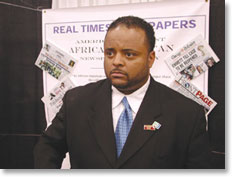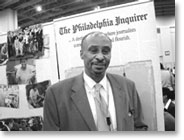
WASHINGTON (FinalCall.com) – Among the more than 7,500 Black, Native American, Hispanic and Asian journalists and others who attended the third Unity-Journalists of Color conference since 1994, there was a stream–though not a tide–of conscientious voices, especially among members of the National Association of Black Journalists (NABJ), the oldest of the four member groups.
–NEWS ANALYSIS–
In plenary sessions this year, the journalists heard speeches from Democratic Party Presidential nominee and U.S. Senator John Kerry (D-Mass.), U.S. Secretary of State Colin Powell and Pres. George Bush.
The politicians will be judged by the voters on election day in November. The journalists, however, are judged by the quality of the question-and-answer sessions with the politicians. For the most part, the panelists selected by the participating groups kept their eyes fixed on the prize–credibility, integrity, and questions that would not have been raised among a group of Whites.
Among those, there was none more focused than NABJ member Roland Martin, a 35-year-old syndicated columnist and an editorial consultant with the Chicago Defender. Mr. Martin first engaged the President in a brief, disarming chit-chat, got him to agree to extend his time with the group and accept a second round of questions from the panel and then held the President’s feet uncomfortably close to the fire of truth.
“Mr. President, you said that eight million people in Afghanistan registered to vote, and as you said, exercised their God-given right to vote,” Mr. Martin began innocently enough.
“Right,” responded the President.
“That may be a right from God, but it’s not guaranteed in the U.S. Constitution. In 2000, an estimated two million people–half African American–had their votes discounted from Florida to Cook County, Illinois to other cities,” he continued, to the applause from the audience. “Are you going to order Attorney General John Ashcroft to send federal election monitors to Florida and other southern states? And in this age of new Constitutional Amendments, will you endorse a Constitutional Amendment guaranteeing every American the right to vote in federal elections?” he insisted, to even more applause.
“First of all, look, I can understand why African Americans, in particular, are worried about being able to vote, since the vote had been denied for so long in the South, in particular. I understand that. And this administration wants everybody to vote,” Mr. Bush responded.
“Now, I–the best thing we did was to pass the Helping America Vote Act–with over, I think it’s $3 billion of help to states and local governments–to make sure the voting process is fair. And it’s not just the South, by the way. The voting process needs help all over the country to make sure that everybody’s vote counts and everybody’s vote matters. I understand that. And that’s why I was happy to work with the Congress to achieve this important piece of legislation.
“Just don’t focus on Florida. Now, I’ll talk to the governor down there to make sure it works. But it’s the whole country that needs–voter registration files need to be updated, the machines need to work. And that’s why there’s $3 billion in the budget to help, Roland. And, obviously, everybody ought to have a vote. And what was your other question?
“Should we guarantee it in the Constitution?” Mr. Martin repeated.
“I’ll consider it. I’ll consider it,” Mr. Bush hastened. “And what’s your second question?”
Mr. Martin then pinned Mr. Bush down on his own admission to Yale University under the “legacy” provision which admits otherwise unqualified family members of Yale graduates, while he remains opposed to special consideration based on race.
“Well, in my case, I had to knock on a lot of doors to follow the old man’s footsteps,” Mr. Bush joked to laughter from the audience. “No, look, if what you’re saying is, is there going to be special treatment for people–in other words, we’re going to have a special exception for certain people in a system that’s supposed to be fair, I agree, I don’t think there ought to be.
“So, the colleges should get rid of legacy?” Mr. Martin persisted.
“Well, I think so, yes,” Mr. Bush replied. “I think it ought to be based upon merit. And I think it also ought to be based upon–(applause)–and I think colleges need to work hard for diversity. Don’t get me wrong. Don’t get me wrong. You said, against affirmative action, is what you said. You put words in my mouth. What I am for is…No, I said was against quotas.”
“So, you support affirmative action, but not quotas,” asked Mr. Martin.
“I support colleges affirmatively taking action to get more minorities in their school. I support diversity, I don’t support quotas. I think quotas are wrong. I think quotas are wrong for people, and so do a lot of people,” Mr. Bush concluded.

That exercise is a classic example of what veteran journalist Acel Moore, an editor at The Philadelphia Inquirer, an NABJ founder and a Pulitzer Prize winner, describes as the delicate balance that Black journalists must seek to maintain.
“Because if you don’t focus on the principles that got us started and remember them, you are going to be destroyed,” Mr. Moore told The Final Call. “When you look at the conference, and you come and you see all the glitz and you see the corporations and you see people looking for jobs–there are more than 500 recruiters–I think you have to look a little deeper than that too.
“There are a group of us (and we) have to keep reminding the younger generation, and some in the older generation, that (just getting a fancy job is) not why we’re here. That’s not really why we’re here.”
“I have not forgotten about the sacrifices that our ancestors made, in order for me to do what I’ve done. When we, as a group, forget that, then we are doomed.
“This organization and the founders feel good that we have increased the numbers. But you have a generation of individuals who have never experienced Jim Crow and the out-and-out, unadulterated racism. What they are experiencing today is different. It’s more sophisticated. To repeat something I heard someone say a few years ago: ‘Jim Crow now has an MBA, and a Ph.D., and a law degree.’”
Racism in the nation’s newsrooms is more sophisticated and more pervasive now than when he entered the news industry a generation ago, said Mr. Moore. It is part of the larger challenge. Thousands of journalists of color–Latinos, Native Americans, Blacks and Asians from all over–who think and know that there is something about their history and about their ethnicity and their reality, that is in conflict with the people who control the media, he said.












